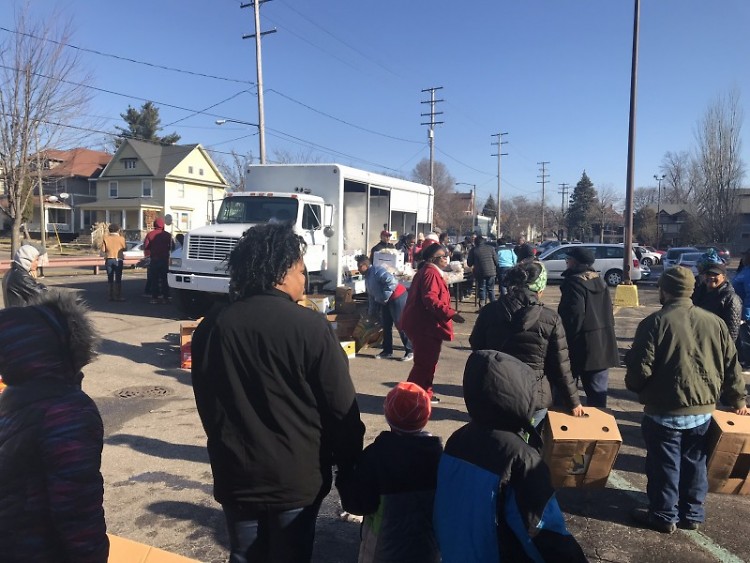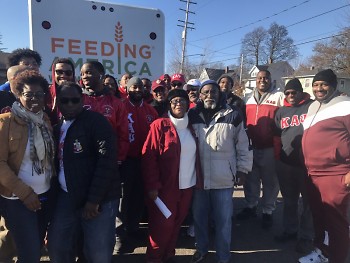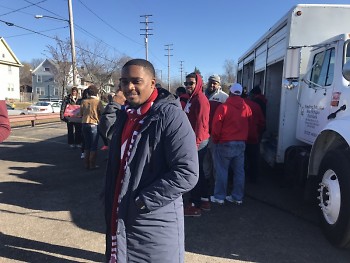Ever since she began attending Pilgrim Rest Missionary Baptist Church at four years old, Beverly has seen her community come together to support neighbors in need, including her own family. Now, as church employees, she and her husband Tyrone manage both the church’s fixed food pantry, which offers staples whenever a neighbor needs them, and its monthly Mobile Food Pantry.
Beverly grew up both giving and receiving food. She was influenced by those who helped her, and wanted to do the same.
“It was something that was in us, that we learned,” she said.
She recalled times when her school’s principal would bring her family of nine a Thanksgiving basket, right to their home. And when they could, her family would bring canned goods to the school.
“I said, ‘I will always do that.’ People were always good to me.”
As an adult, Beverly began living out her desire to help others. When community members said they were hungry, Pilgrim Rest’s pastor would dip into his own pockets to help. In response, Beverly and others at the church decided they needed to come together to support their neighbors.
They began turning their homes into pantries, inviting hungry neighbors to share their food and home-cooked meals. Feeding families from their homes wasn’t the easiest set-up, so when Beverly and the church learned about Feeding America West Michigan 30 years ago, they jumped on board and created a fixed food pantry. The church began hosting Mobile Pantries as well, soon after they were introduced to the idea more than twelve years ago.
Each month, Pilgrim Rest’s fixed food pantry serves around 70 families facing hunger in their community. At each Mobile Food Pantry, around 125 people go through the distribution line, filling their boxes with fresh produce, shelf-stable dry goods, protein and other surplus food donated by local farms, grocery stores and manufacturers.
Beverly encounters many clients who want to give back, whether through volunteering or donating. She described a recent story that struck her:
“One of the ladies that came, she says, ‘I don’t have anything. You all do so much for everybody.’ She had a dollar and said, ‘Can you take this?’”
Beverly accepted the dollar, but told the woman to let the church know if she needed anything.
Having access to the Mobile Food Pantry gives community members – like Deandre, a 46-year-old grandfather of four – wiggle room in their budget to prioritize other necessities. Deandre has been living on disability benefits since he broke both of his ankles and parts of his leg a few years ago. He makes it out to the Mobile Pantries even though it’s painful to stand in line.
“Every little bit helps,” he said.
Like Deandre, Sarah and John see Mobile Food Pantries as a big help: They can pay their bills while still giving their five growing kids healthy options. Before they discovered Mobile Pantries, their grocery bill often exceeded $500 a month – and that was just for basics from budget grocery stores.
“Having this lowers our bill so we can pay other bills on time,” Sarah said. “I usually grab everything that’s offered. If there’s extra fruits and vegetables we usually grab those because that’s most important to us.”
Pilgrim Rest’s Mobile Pantries are often sponsored by community organizations, like Brown’s Funeral Home located down the street from the church. This distribution was sponsored by the Grand Rapids chapter of the fraternity Kappa Alpha Psi.
Like Beverly, fraternity member Lionel grew up experiencing hunger. He received food – called “gleaners’ bags” – at his middle school, an experience that inspired him to want to give back. When he was brainstorming ways his fraternity could serve their community, Lionel remembered his experience in middle school and considered passing out groceries and toiletry items directly from his car – just like Beverly and other church members used to cook meals for neighbors in their homes.
Online research led Lionel to Feeding America West Michigan’s Mobile Food Pantry program, preventing him from having to stock his own car full of food. To equal the size of a Mobile Pantry, Lionel’s car would have had to fit 5,000 pounds of food – which equals more than 4,100 meals for neighbors facing hunger.
Kappa Alpha Psi was eager to help – nearly 30 members volunteered at one of the food distributions they sponsored.
Fraternity president Darius emphasized that volunteering at this Mobile Pantry was particularly significant for their members. Because a lot of them grew up in the 49507 area code, giving back to the area felt especially important. Both Darius and Lionel said they knew people who went through the line that day.
“I think that’s what makes it better,” Lionel said. “When you know, ‘yes, they will get something to eat today,’ I think that’s what puts a smile on our face.”
April, a volunteer, church member and often a client herself, echoed this sentiment. The community’s support brings a smile to her face as well:
“This right here is an awakening that you ain’t by yourself,” she said. “You know even when you’re hurting and you don’t have anything – right here is the help.”
The Rapidian, a program of the 501(c)3 nonprofit Community Media Center, relies on the community’s support to help cover the cost of training reporters and publishing content.
We need your help.
If each of our readers and content creators who values this community platform help support its creation and maintenance, The Rapidian can continue to educate and facilitate a conversation around issues for years to come.
Please support The Rapidian and make a contribution today.


